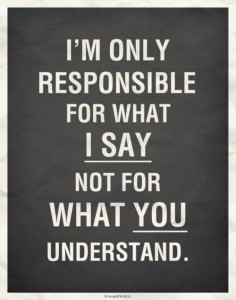
1. Words are imprecise vehicles of communication
Often what we experience do not fit into words and sentences very well, we are not able to say precisely what we mean. Words have different meaning for different people.
2. Guessing the meaning of the speaker’s “code”
People often code their messages so their real meaning is masked. When we are ambivalent about expressing ourselves (a part of us wants to be known and another to be hidden) we speak obscurely. We can also code our messages without trying, after all we have been training from early childhood to express ourselves indirectly (e.g. kids ask questions in bedtime when they just want company).
Decoding is always guesswork. We can hear a person’s words, we can observe his actions but we can only conclude what the words/actions mean.A person’s behavior is observable (phenomenology), a person’s thoughts are not directly observable (only clues are her words and actions), feelings are even more concealed.
| HOW MEANT | HOW SENT | HOW RECEIVED |
| Speaker’s thoughts and feelings: private, known only to the speaker) | Speaker’s actions/words: often imprecise/masked expressions of his thoughts/feelings or attempts at concealment | Listener’s interpretation of the meaning behind the speaker’s actions/words: private, known only to the listener |
Figure 1. The inexactness of the communication process
3. The presenting topic may not be the major issue
Each person conceals much of himself from others. Everyone travels incognito to some degree. This can result in the speaker talking about one topic while avoiding to speak about something more important or simply she doesn’t come directly to the point.
4. The speaker may be blind to her emotions of blinded by them.
Our culture teaches people to repress their feelings. On the one hand people are often unaware of their emotions (blind to our emotions) and on the other hand feelings come out with such intensity that they control us (blinded by our emotions) and we can behave in destructive for us/others ways.
Our emotions help shape our values. They are a fundamental part of our motivation and help determine our direction and purpose in life. Emotions provide us with needed clues for solving our problems and also relate to others. Reflective responses help children and adults become aware of their inner world of emotion e.g.“it looks as though you are very angry”.
When a person has a chance to talk about intense feelings to an empathic listener, the likelihood of acting irrationally/destructively on those feelings is diminished.
5. Many listeners are easily distracted
The listener begins to listen the speaker with interest, the listener’s mind might get bored with the slow pace of conversation and take a mental vacation while the speaker is talking and still get the message. She checks back with the speaker from time to time and makes appropriate remarks but spends most of the time with her own thoughts.
6. Filters distort what the listener hears
Everyone has few emotional filters that block or distort messages sent to us. Modern people have to develop a self-protective mechanism to defend themselves from the constant acoustical bombardment of 21st century living. The mechanism protects us and also keeps us away from many things.
Filters also develop when parents, teachers or other adults…may have coupled words e.g. hospital, death, immigrant, cop, anger, work, money, marriage…with pleasant or unpleasant feelings. When such conditioning takes place the child reacts to the words emotionally.
Our expectations of others constitute another set of filters through which we listen. A person’s self-image may distort the reception of the speaker’s thoughts and feelings. Someone with low self-esteem may expect criticism from others and read that meaning into the most innocent statements.
KEYPOINT!! Since it ‘s so difficult for people to say precisely what is on their minds and in their hearts and since it ‘s so hard to listen without distraction or distortion to what others are saying, we need to check for accuracy in our conversations. To do this, the effective listener frequently reflects back the essence of what he has heard as a check that his understanding match the speaker’s meanings.
